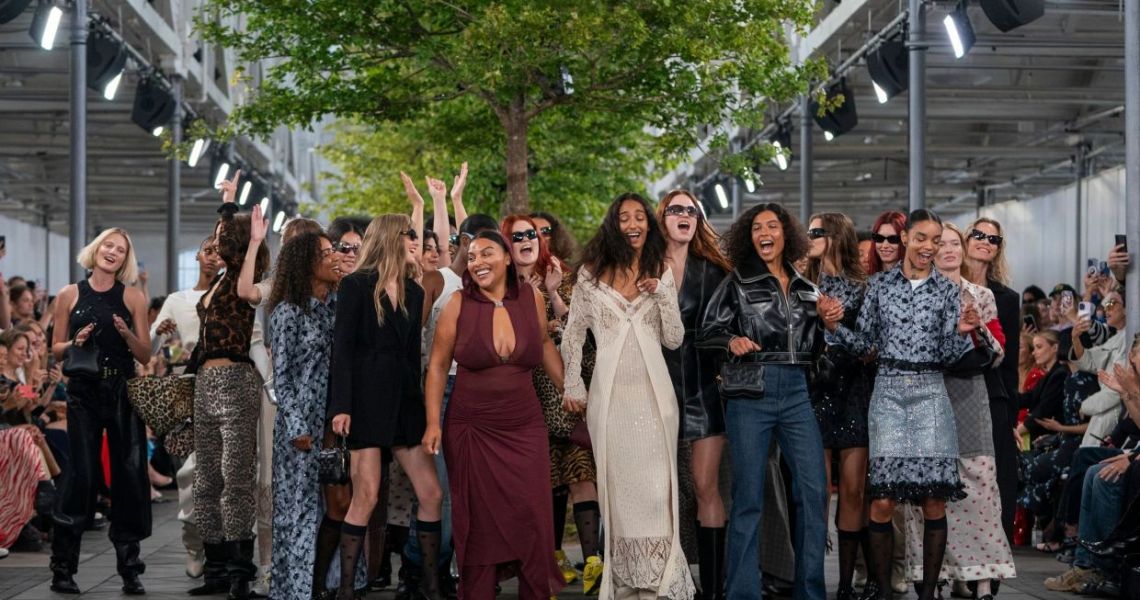The big four fashion weeks have yet to begin, but last week, Copenhagen Fashion Week played out a refreshing mix of newer and older Scandi brands. Don’t forget to subscribe to the Glossy Podcast for interviews with fashion industry leaders and Week in Review episodes, and the Glossy Beauty Podcast for interviews from the beauty industry. –Zofia Zwieglinska, international fashion reporter
Copenhagen Fashion Week highlights
Hosted in Denmark, the Scandi fashion week wrapped o Friday. Mainstay brands like Stine Goya, Ganni and Rotate exhibited, as did more emerging brands like Paolina Russo.
On August 10, Ganni exhibited an AI-integrated catwalk, where show attendees could talk to the “Ganni girl” trees equipped with voiced AI bots that were placed around the venue. The prompt was to ask about her interests and thoughts. On TikTok, users could listen to how the trees described themselves, although there were not many social posts about the AI initiative. In June, Ganni co-founder Nicolaj Reffstrup said that the company focuses on innovation when looking at sustainability.
In addition, Ganni, Remain, Cecilie Bahnsen and Stine Goya participated in a collaboration between CPFW and mobile game Drest that ran until August 12. Drest players could use the brands’ clothing to dress up avatars and complete a CPFW-themed quest to win in-game items. The initiative is part of Drest’s aim to further link digital fashion, sustainability and gaming.
In other news from the event’s rain-soaked catwalks, Gigi Hadid’s older sister Alana made her debut on the Saks Potts runway, while Helena Christensen closed Stine Goya.
Ralph Lauren pulls away from ‘value-orientated’ customers
Ad position: web_incontent_pos1
Revealed on its August 10 earnings call, Ralph Lauren is refocusing its product range to better cater to the luxury customer. The company’s CEO, Patrice Louvet, said the brand now has a just small percentage of “value-oriented” consumers.
The company’s first-quarter revenues remained flat year-on-year, at $1.5 billion, with a decline in its biggest market: the U.S. In the states, revenues dropped 10% year-on-year to $632 million, after a 3% decline in the prior quarter.
With the news of the acquisition of Capri Holdings by Tapestry, Inc., preemptively dubbed the “U.S. LVMH,” the state of the U.S. fashion market is going through some changes. In previous years, Ralph Lauren was reportedly an M&A target for both Kering and LVMH, but it has held onto its positioning as one of the strongest independent American brands. As Tapestry, Inc. focuses on strengthening its accessories and fashion divisions through Capri’s Michael Kors, Jimmy Choo and Versace, the effect on Ralph Lauren’s market share remains to be seen.
Going into Q3, Chinese group travel is expected to rebound
China’s Ministry of Culture and Tourism said on August 10 that it had ended its ban on group tours to 78 different locations across the world. This comes after a three-year ban on international travel to curb the spread of Coronavirus. Chinese travelers can now visit the U.S., Japan, South Korea, the U.K., Germany and Australia, among other countries.
Ad position: web_incontent_pos2
As a result of the announcement, luxury stocks surged, with increases led by LVMH — stock closed the day up 3.4%, to €834.70 ($913). Hermès’s stock, meanwhile, rose 3.2% to €1,960.20 ($2,147).
The news may prove to deliver the “revenge buying” boom that was predicted for earlier this year. That’s especially as luxury brands have focused on localization in both product and store offerings to differentiate their presence across the world.




